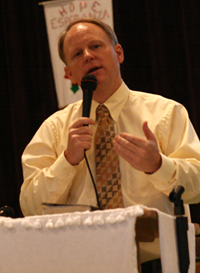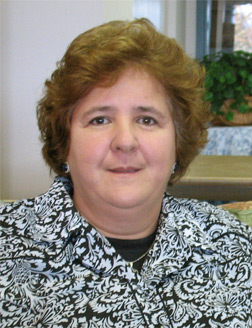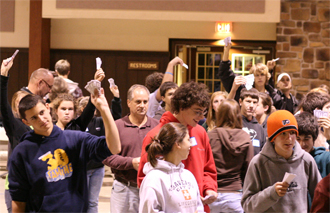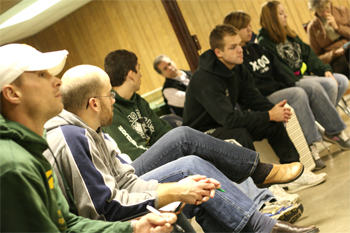AKRON, Pa. — In Mennonite and Brethren in Christ churches across the United States, recent immigrants are helping their congregations reach out to other immigrants, according to a listening project conducted by Mennonite Central Committee (MCC) U.S.
Through the listening project, MCC staff members facilitated discussions about immigration in more than 30 Anabaptist congregations in 10 states and Washington, D.C. About a third of the congregations were made up primarily of people whose families immigrated within one generation. The listening included a number of Franconia Conference congregations.
A report from the listening project, “What the Church is Saying,” suggests that Anabaptist congregations with many recent immigrants are the most active in befriending immigrants and helping with needs
such as food and housing.
A featured congregation is New Hope Fellowship, a bilingual Franconia Conference partner congregation in Alexandria, Va. About half of the church’s 60-some attendees are Latino, and many are recent immigrants.
 New Hope Fellowship builds relationships with recent immigrants in a variety of ways, according to Kirk Hanger, the church’s pastor. Latino members often lead the way in inviting new immigrants to church. As a whole, church members use their community ties and knowledge to help immigrants. That can range from helping connect people with social services to providing occasional assistance for food or rent.
New Hope Fellowship builds relationships with recent immigrants in a variety of ways, according to Kirk Hanger, the church’s pastor. Latino members often lead the way in inviting new immigrants to church. As a whole, church members use their community ties and knowledge to help immigrants. That can range from helping connect people with social services to providing occasional assistance for food or rent.
“We know how systems function here, and we can be a bridge for people,” Hanger says.
 In one case, Hanger accompanied an immigrant couple to court after they were wrongly accused of shoplifting because they did not understand how to use an automatic checkout machine.
In one case, Hanger accompanied an immigrant couple to court after they were wrongly accused of shoplifting because they did not understand how to use an automatic checkout machine.
The pastor and couple prayed outside the courtroom, asking God to move in the situation. Then the pastor spoke to the prosecutor about the couple’s misunderstanding, and the prosecutor ultimately agreed to drop the charges.
“I believe God worked and changed his heart,” Hanger says.
According to the listening project report, Anabaptist churches largely oppose unjust treatment of immigrants. However, members of predominantly white congregations without recent immigrants express reluctance about providing support to undocumented immigrants.
Rebeca Jimenez Yoder, the listening project coordinator, says she believes that God calls churches to welcome strangers in their community, including undocumented immigrants.
“We do have undocumented immigrants in our churches,” Yoder says. “They are our brothers and sisters.”
 Yoder says that the purpose of the listening project was to encourage conversation about immigration. If the conversation leads to action, there are many ways for churches to support immigrants, from teaching
Yoder says that the purpose of the listening project was to encourage conversation about immigration. If the conversation leads to action, there are many ways for churches to support immigrants, from teaching
English to advocating for more humane immigration laws, she says.
The website includes a number of other immigration resources for churches, including “Loving Strangers as Ourselves,” a series of Biblical reflections on immigration, and “Welcoming the
Newcomer: Doing Advocacy with Immigrants.”
To hear more of the outcomes and converse with other Franconia Conference leaders about the findings, join an informal dinner catered by Philadelphia Praise Center at the Mennonite Conference Center in Souderton, Pa, on Wednesday, January 23 from 5:30-6:45.
Tim Shenk is a writer for Mennonite Central Committee.

 As part of
As part of  Cuban pastor Beatriz Lopez arrived in the United States earlier this month on an invitation to visit with leaders from several church organizations, including Franconia Mennonite Conference. Beatriz is the President of the 55-year-old Pentecostal Holiness Church in Cuba, an organization of 30 churches, 16 missions, and a number of house churches throughout the island.
Cuban pastor Beatriz Lopez arrived in the United States earlier this month on an invitation to visit with leaders from several church organizations, including Franconia Mennonite Conference. Beatriz is the President of the 55-year-old Pentecostal Holiness Church in Cuba, an organization of 30 churches, 16 missions, and a number of house churches throughout the island. Youth, sponsors, and pastors from 15 area congregations gathered recently for the annual Youth Leadership Retreat at
Youth, sponsors, and pastors from 15 area congregations gathered recently for the annual Youth Leadership Retreat at  Curt opened the gathering with a call to create an intentional community for the time spent at Spruce Lake. He acknowledged that youth, with their curiosity and tough questions, have the ability to challenge adults to recommit to their faith. During the weekend, Curt used a spiritual type tool published by the Alban Institute entitled “Discover Your Spiritual Type.” It was followed by a case study that revolved around challenging leadership decisions in congregations. The case study involved discerning a request from
Curt opened the gathering with a call to create an intentional community for the time spent at Spruce Lake. He acknowledged that youth, with their curiosity and tough questions, have the ability to challenge adults to recommit to their faith. During the weekend, Curt used a spiritual type tool published by the Alban Institute entitled “Discover Your Spiritual Type.” It was followed by a case study that revolved around challenging leadership decisions in congregations. The case study involved discerning a request from  Emma, Kate, and Brittany attended two workshops together. They said the workshops were relevant, more interesting than anticipated, and that they had been challenged to think differently about the issues addressed in each session.
Emma, Kate, and Brittany attended two workshops together. They said the workshops were relevant, more interesting than anticipated, and that they had been challenged to think differently about the issues addressed in each session.